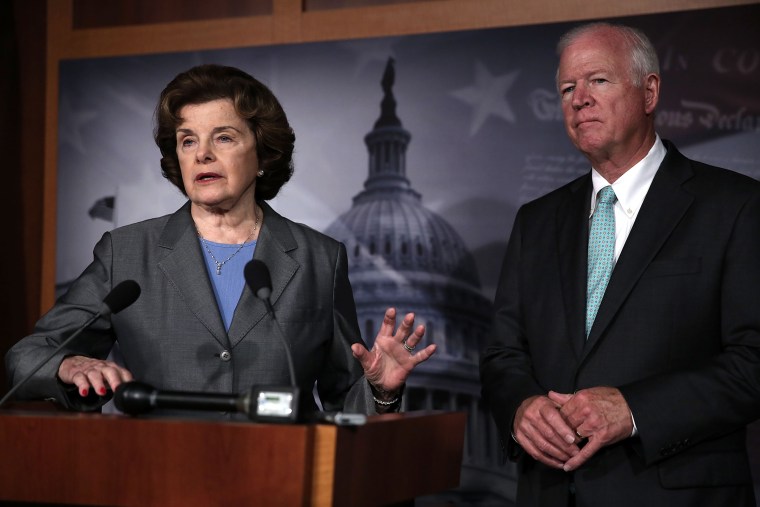There's nothing partisan about the dispute between Congress and the CIA. In fact, just the opposite is true -- if the intelligence agency spied on Senate staffers, it's exactly the kind of controversy on which lawmakers in both parties can work together and demand accountability.
And at first, that seemed likely. When Sen. Dianne Feinstein (D-Calif.), head of the Senate Intelligence Committee,
spoke at length this week about the allegations, she received
quick support from some Republican lawmakers. Sen. Lindsey Graham (R-S.C.), for example,
said, "This is dangerous to a democracy. Heads should roll. People should go to jail, if it's true. The legislative branch should declare war on the CIA, if it's true."
This wasn't necessarily a surprise. The differences between the parties may be greater than at any moment in recent history, but this chasm notwithstanding, they're all part of the same branch of government. In other words, at an institutional level, they're on the same team. When it comes to alleged CIA snooping, there's no reason lawmakers should be at odds with each other.
The top Republican on the Senate Intelligence Committee refused to endorse Chairwoman Dianne Feinstein's explosive allegations of CIA spying on the committee, telling the Senate on Wednesday that a special investigator may be needed to get to the truth. Sen. Saxby Chambliss of Georgia said in a Senate floor speech that Republicans were not part of the committee's investigation on CIA enhanced interrogation and therefore don't know whether the agency spied on the panel as it was conducting its review.
"We do not know the actual facts concerning the CIA's alleged actions or all of the specific details about the actions by the committee staff," Chambliss said, striking a very different posture from McCain and Graham. The Georgian added, "Eventually we will get to the bottom of this. But today I cannot make a statement that would reflect what actually occurred and therefore what recommendations we ought to make as we move forward."
Sen. Marco Rubio (R-Fla.) made similar comments,
telling Bloomberg Television, "I think it's a bit more complicated than what's being put out there by Sen. Feinstein or others."
Away from the cameras, the partisan divisions were reportedly
growing deeper.
A partisan brawl has erupted behind the scenes on the secretive Senate Intelligence Committee, with the two parties at a bitter impasse over the panel's highly sensitive review of Bush-era interrogation techniques. Republicans say not only that the committee's chairwoman, Sen. Dianne Feinstein (D-Calif.), has provided selective information to the public about allegedly improper CIA conduct, they are also pointing the finger at Sen. Mark Udall. The Colorado Democrat, Republicans say, shouldn't have disclosed internal Senate proceedings over the CIA investigation -- something that some Republicans privately say should warrant an Ethics Committee review.
Without more information, it's hard to evaluate the criticisms of Udall on the merits, but there is a larger context -- Udall is a top target for Republicans in the 2014 elections.
